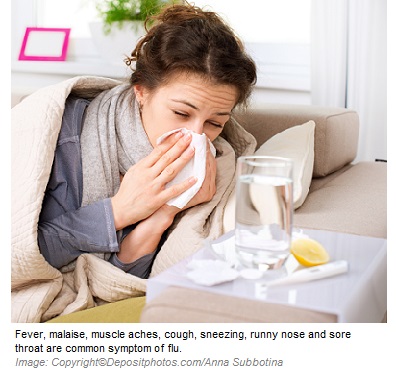Influenza, commonly known among public as flu, is an acute infection of the upper or lower respiratory tracts
 caused by influenza viruses. It is characterized by sudden onset of systemic symptoms, such as fever, chills, sore throat, cough, headaches, muscle pain, and malaise. The body temperature rises quickly within the first 24 hours and then starts gradually declining over 2 – 3 days.
caused by influenza viruses. It is characterized by sudden onset of systemic symptoms, such as fever, chills, sore throat, cough, headaches, muscle pain, and malaise. The body temperature rises quickly within the first 24 hours and then starts gradually declining over 2 – 3 days.
As systemic symptoms subside, respiratory symptoms (cough, sneezing, runny nose and sore throat) usually become more prominent and they may last for more than a week. People with flu may also complain of ocular symptoms, such as photophobia, pain when moving the eyes, and burning of the eyes.
Potential contributing factors:
- Weak immune system.
- Stress.
- Lack of sleep.
- Poor diet.
- Nutritional deficiencies.
Nutritional Supports:
Restricted Foods:
- Processed foods.
- Fried foods.
- Sugars and sweets, as they weaken the immune system.
- Foods that increase production of mucus: sugars, chocolate, dairy products, caffeine, bananas, eggs, wheat products, pastries, and beer.
- Red meats.
- Allergenic foods.
- Carbonated drinks.
- Caffeinated beverages.
- Alcohol.
- Cold or iced drinks.
- Frozen foods.
Recommended Foods:
- Water: 2 – 3 liters a day, as dehydration may exacerbate symptoms.
- Chicken soup or broth. It contains a high level of amino acid cysteine, which thins out mucus.
- Hot barley soup.
- Fish.
- Legumes.
- Flaxseeds.
- Fresh fruits and vegetables, especially onions, garlic, ginger, horseradish, and mustard.
- Cayenne pepper, as it contains capsaicin that it may relieve airways irritation and congestion.
- Fruits and vegetables high in vitamin C: lime, lemon, grapefruit, orange, tangerine, tomato, and potatoes.
- Foods high in flavonoids: berries.
- Fruits and vegetables high in volatile oils: guava, grapefruit, lime, lemon, orange, tangerine, basil, celery, coriander, parsley, peppermint and spearmint. Volatile oils have antiviral and anti-inflammatory activities.
- Ginger.
- Cinnamon.
- Green tea.
- Camomile tea.
Recommended Supplements:
- Vitamin C: 2 – 3 grams a day.
- French Maritime Pine Bark Extract: 200 – 300 mg a day. It is a powerful antioxidant with immune-boosting and anti-inflammatory activities.
- Zinc: as a tablet, 50 – 100 mg a day, or zinc lozenge (providing 15 – 25 mg of elemental zinc) as instructed. This mineral supports the immune system.
- Grape Seed Extract: 100 – 200 mg a day.
- Andrographis Extract: 500 – 2000 mg a day. This herb has anti-viral and immune boosting properties.
- Echinacea: as a capsule or pill, 300 – 900 mg a day, or as a tincture, 3 – 9 ml a day.
- Licorice: 1000 – 2000 mg a day, or 1 ml of the tincture 3 – 4 times a day. Licorice alleviates irritation of the respiratory tract.
- Asian Ginseng (Panax ginseng): 200 – 300 mg a day.
- Siberian Ginseng (Eleuthero): as a dried root, 2 – 4 grams a day, as an extract, 500 – 1000 mg a day. It improves fatigue and malaise.
- Astragalus: 1000 – 2000 mg a day, or 3 ml of tincture 2 – 3 times a day. Astragalus supports immune system against infections. Caution: you should avoid taking this product if you have a fever.
- Oregano Oil (containing over 50% carvacrol): as a capsule, 500 – 1000 mg a day or as a liquid, 0.5 ml twice daily.
- Multivitamins – Multiminerals: A high potency product.
Miscellaneous Suggestions:
- Aromatherapy with eucalyptus or lavender.
- Hydrotherapy with hot baths and showers.

